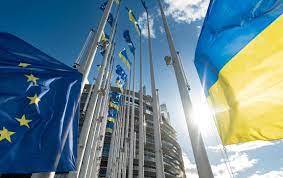Europe is preparing to extend visa-free trade with Ukraine

The European Parliament made amendments to the proposal on the continuation of trade liberalization with Ukraine. The MEPs, with 347 votes in favor, decided to amend the European Commission's proposal to suspend import duties and quotas for Ukrainian agricultural exports to the EU for one more year. This decision provides for the strengthening of guarantees for EU farmers - this is what the European Parliament believes.
Currently, the deputies have returned the document to the specialized committee on international trade of the European Parliament, which last week already supported a similar decision, so that it could start negotiations on making changes to the European Commission's proposal with the Council of the EU. The MPs also voted to amend the European Commission's proposal to introduce more sensitive products and introduce a broader reference date for calculating average volumes. At the same time, MEPs agreed to suspend all tariffs on imports from Moldova for another year, as this country relies on Ukrainian transit routes for its own exports, and it was "also hit hard" by Russia's military aggression against Ukraine.
In general, the European Commission has finally recognized that the agricultural sector will become the main problem of Ukraine's European integration. As the vice-president of the European Commission, Valdis Dombrovskis, said, the strategic choice has already been made, and work is currently underway to integrate it into the single market of the community. At the same time, he noted that the situation with the ban on Ukrainian agricultural products by some EU countries is a short-term phenomenon that arose as a result of the war, the blocking of the Black Sea corridors and the disruption of trade flows. Personally, he does not see any serious problems for the European integration of Ukraine outside of agriculture, because access to the EU market for all Ukrainian goods has already been completely liberalized. So the only sector where there are really problems is agriculture. Discussions regarding the future common agricultural policy in the EU in the context of Ukraine's potential accession are already ongoing. The same negotiations will be held with regard to other sectors. In particular, before the war, there were preventive measures regarding steel, which also applied to Ukraine. Currently, they do not apply to Ukraine, so there should not be any problems with metallurgy. In fact, Europe is already working to support Ukraine's integration into the single European market, and there is already a priority action plan.
At the same time, attempts to put pressure on the Ukrainian agricultural sector by some representatives of the EU are connected with the fact that Ukraine, even without being a member of the union, is already actively present on the European market. At one time, Poland, joining the European Union, also faced strict regulations. In addition, Spain, being a member of the EU, did not have access to its market for 10 years. Therefore, there is confusion in the European Union regarding the starting point of negotiations with Ukraine on its accession. And the most piquant thing is that Ukraine is starting negotiations when it has already deeply entered the European market.
It is worth noting that currently the European Parliament called for the introduction of an urgent embargo on agricultural products from Russia and Belarus - representatives of most political groups in the European Parliament spoke in favor of sanctions on agricultural products from Russia and Belarus. The debate on this issue took place on March 12. For example, representative of Poland Andrzej Halitsky called for an urgent embargo on Russian agricultural products on behalf of the European People's Party, the largest group in the European Parliament. According to him, Russia throws its food into Europe and uses it as a weapon. Currently, experts notice an increase in the import of food and grain from Russia and Belarus at dumping prices, and this is an alarming trend. The Lithuanian MP Piatras Aushtriavičius, who represented the Renew Europe group, also called for the import of grain and other Russian and Belarusian food products to the EU market to be stopped as soon as possible. According to him, in 2023, the Russian Federation and Belarus sold more than 1.5 million tons of grain to the EU market, which "creates unfair price competition, worsening the situation of farmers in the European Union." The introduction of the embargo was also supported by representatives of the groups "Progressive Alliance of Socialists and Democrats", "European Conservatives and Reformists" and "Identity and Democracy".
In general, the European Commission has already stated that the European Union constantly monitors the flow of agricultural products to the EU, especially from Ukraine and Russia. For now, the EU will continue to "extremely closely monitor" these trade flows and, in this context, assess what further action needs to be taken if necessary.
 Found a mistake on the site? Tell us:
Found a mistake on the site? Tell us:

 Telegram
Telegram